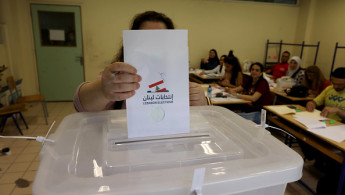Newly elected Lebanon MP under fire after tweet emerges calling for 'genocide' of Syrians
Welcome to The New Arab's coverage of Lebanon's General Election 2022 held on May 15, 2022. Follow live updates, results, analyses, and opinion in our special hub here.
Newly elected Lebanese parliamentarian Cynthia Zarazir has come under pressure for a past tweet calling for the 'genocide' of Syrians.
Zarazir on Monday evening won a seat for the opposition "Li Watani" (For My Nation) list in Beirut's first district in the country's long-awaited elections.
However, in 2016, she called for the "genocide" of Syrians, saying they were a 'problem' for Lebanon.
"Together for the genocide of Syrians, I don't care what gender or sect. They've done nothing but caused trouble to Lebanon," she said at the time.
Nazi @CynthiaZarazir gets elected in the Lebanese parliament.
— Middle East Observer 2 (@ME_Observer_2) May 16, 2022
Her tweet in 2016 : Together for the genocide against Syrians no matter what background they have. pic.twitter.com/6DcDbOBpRA
After Zarazir's election her 2016 tweet resurfaced again, and sparked outrage on social media.
When asked about the tweet in a recent interview, she apologised for her language but said she doesn't regret her position against Syrian refugees.
"I am sorry for using the word 'genocide'. I made a mistake and I admit in front of everyone that I was wrong. However, I don't regret my position on Syrian refugees," she said.
There are over 1.5 million Syrian refugees living in Lebanon, most of whom fled brutal regime and Russian assaults on opposition-held towns in Syria.
NGOs have reported many incidents of discrimination against Syrians, including withholding pay, assaults, and other abuses.
شو منّا مسطرة... https://t.co/KOzKw3XRX7 pic.twitter.com/c2AviQArQs
— علي 🇱🇧🇨🇦 (@allouush) May 17, 2022
The final results of Lebanon's long-awaited elections are now coming in, with a large number of independent and opposition MPs winning seats in parliament and the Iran-backed Hezbollah movement and its allies losing their parliamentary majority.
Syrians in parts of the country were ordered to remain in their homes on election day, in a measure described as "racist" by rights groups.
The election results have reflected anger at the country's establishment, which has been widely blamed for Lebanon's economic meltdown, and the devastating Beirut port blast of 2020.
Analysts have suggested that voters disillusioned with Lebanon's establishment parties, in addition to a high voter turnout among Lebanese expatriates, led to the surge in support for independents.





 Follow the Middle East's top stories in English at The New Arab on Google News
Follow the Middle East's top stories in English at The New Arab on Google News

![MP Essam Diab's pursuit to block TikTok in Egypt has revived an already ongoing debate in the country. [Getty]](/sites/default/files/styles/image_330x185/public/1230748046.jpeg?h=a5f2f23a&itok=-8MqBLLC)
